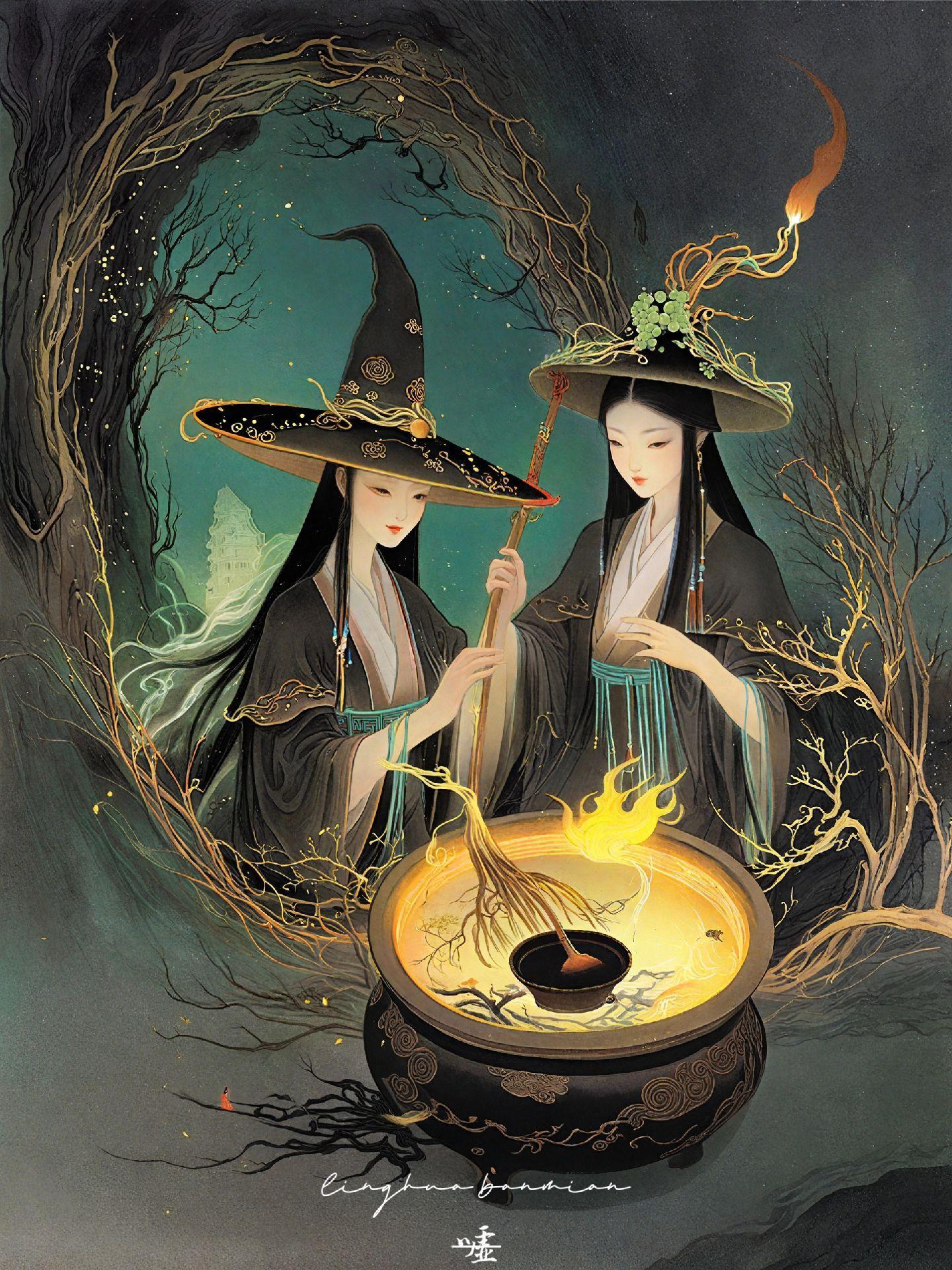In an ancient and peaceful small town, there lived a young woman. Although she was fair and kind-hearted, she had endured the hardships of life since childhood due to her poor family. The thatched cottage at home was dilapidated and often swayed in the wind and rain. And she could only have simple meals to fill her stomach every day. Such a poor family background made the neighboring families turn away when choosing marriage partners for their children, so she had difficulty finding a suitable person for marriage even at the age of getting married.
Although there was much helplessness and bitterness in the woman's heart, she still cherished a longing for a better life. Not far from the small town, there was a solemn and mysterious Taoist temple, where incense smoke curled up slowly and the bell rang out melodiously, often carrying the sounds of Taoist priests chanting scriptures and performing rituals. The woman had heard that the deities in Taoism were compassionate and could protect the people in the world, so she often went to the temple with a pious heart to pray for marriage.
Every time she stepped into the temple, the woman would be deeply impressed by the solemn and sacred atmosphere. Inside the lofty hall, the statues of the Three Pure Ones were enshrined. The expressions on the statues' faces were serene, and their gazes seemed to be able to perceive everything in the world. She respectfully offered the wildflowers she picked by herself and the little coarse food at home in front of the statues, then knelt down piously and kowtowed, murmuring prayers, begging the deities to take pity on her situation and bestow a beautiful marriage upon her. Her eyes were full of expectation and longing, which was a deep yearning for love and a happy life.
Days passed by like this, and it seemed that the woman's prayers hadn't received an obvious response, but she never gave up. She firmly believed that as long as she was sincere, she would move the heavens one day.
Until one day, when she was about to get up and leave after praying in the temple as usual, an old Taoist priest in a Taoist robe stopped her. The old Taoist priest had white hair, but his eyes were deep and bright, as if containing endless wisdom. He walked slowly towards the woman, holding a golden nanmu bracelet in his hand, and handed it to her, saying, "This wood is a gift from heaven for fate. Wearing it can attract true love."
The woman took the bracelet and examined it carefully. She saw that the bracelet emitted a faint golden luster, and each bead was round and smooth, as if it had been carefully polished by time. She could smell a faint fragrance of the wood, which was elegant and long-lasting, making people feel refreshed when they smelled it. The woman was filled with gratitude in her heart. She knew it was the kind intention of the Taoist priest and also her last hope. She respectfully bowed to the old Taoist priest and then carefully put on the bracelet on her wrist.
Since then, wherever the woman went, she wore this golden nanmu bracelet. When she was washing clothes by the brook, the bracelet swayed gently with her movements, and the golden nanmu sparkled with a charming light in the sunlight; when she was working in the fields, her sweat dripped onto the bracelet, but it didn't affect its luster at all. Instead, it seemed to be nourishing this wood with mysterious power; when she went to sleep at night, she also put the bracelet beside her pillow and fell asleep in the faint fragrance of the wood, and in her dreams, there seemed to be a vague figure approaching her.
Perhaps the woman's sincerity had moved the heavens, or perhaps the golden nanmu really had magical power. Before long, by chance, the woman met a young man. It was in the market of the small town, where people were coming and going, and it was bustling. The woman was concentrating on choosing the items needed at home when she accidentally bumped into the young man beside her. They both apologized hurriedly, and at the moment when they looked up and their eyes met, they both saw a special light in each other's eyes.
The young man was attracted by the woman's simplicity and kindness, and the woman was also attracted by the young man's honesty and enthusiasm. They began to talk and found that they had many common interests and similar life concepts. They both loved nature and liked to take walks among the mountains and waters, feeling the spiritual energy of heaven and earth; they both adhered to the qualities of diligence and kindness, believing that they could create a beautiful life through their own efforts; they were also both deeply interested in the culture and ideas of Taoism, thinking that everything in the world had its own rules and destinies, and people should conform to nature and hold a reverent heart.
As their communication deepened day by day, their feelings for each other also grew stronger. They would climb the hill behind the small town together in the early morning to welcome the first ray of sunlight, feeling the warmth of the sunlight on their bodies, as if it were a blessing from heaven for their love; they would take a walk by the river in the evening, watching the afterglow of the sunset dye the river golden, and sharing their joys and sorrows of the day with each other; they would also discuss the classic doctrines of Taoism in their spare time, from "The Tao that can be told is not the eternal Tao" in "Tao Te Ching" to "A Happy Excursion" in "Zhuangzi". In their understanding of Taoist thoughts, they got to know each other's inner worlds more deeply.
Finally, on an auspicious day, they got married with the blessings of their relatives and friends. The wedding was held in the small town. Although there was no luxurious pomp, it was full of deep warmth. People were laughing and talking, blessing the new couple a harmonious union lasting a hundred years and eternal love. The woman knew in her heart that all of this was inseparable from the blessing of Taoism and the magical power of the golden nanmu.
After marriage, their life was peaceful and happy. They supported each other and worked hard together to manage their family life in an orderly manner. The woman would prepare steaming hot breakfast for her husband in the early morning, and then they would read Taoist classics together in the courtyard, feeling the tranquility and peace; the husband would work hard in the fields, and the woman would help beside him, and their figures formed a harmonious and beautiful picture in the sunlight.
In life, they also always adhered to the teachings of Taoism. They respected life. Whether it was the livestock at home or the ants in the fields, they would try their best to avoid harming them; they advocated thrift, didn't waste extravagantly, and cherished every resource in life; they were always ready to help others and often distributed the surplus food and clothes at home to the poor neighbors, passing on warmth and kindness with their love.
As time went by, their love was like that golden nanmu bracelet, becoming more mellow. They had children, and under their influence, the children also showed respect and love for Taoist culture. The children grew up listening to their parents tell Taoist stories. They knew that their parents' love was a gift from heaven and also under the protection of Taoist blessings.
And that golden nanmu bracelet became a family heirloom in their family. It was treasured in a beautiful box. Whenever there were important things in the family or when they encountered difficulties, they would take out the bracelet, put it on the offering table, burn incense and pray, hoping to receive the protection and guidance of Taoism again. The faint fragrance of the wood seemed to be able to travel through time, connecting the past and the present, and passing on the blessings of Taoism from generation to generation.
In this small town, the love story of the woman and the young man became a much-told tale among the people. It showed people the profound influence of Taoist culture among the folk, and also made people believe that in this world, there were always some mysterious and beautiful forces silently guarding the true feelings and kindness in the world. That golden nanmu bracelet was not only an ornament but also a symbol of Taoist blessings and human love. It would always shine with a mysterious and charming light, inspiring people to move forward bravely with hope in their hearts on the road to happiness.
Many years later, when the woman and the young man had entered their old age, they often sat under the old tree in the courtyard, reminiscing about the bits and pieces of the past. Their hands were tightly held together. Although the golden nanmu bracelet on their wrists was no longer as new as it was at the beginning, it carried their lifetime of love and memories. They were grateful for the fate given by Taoism and also glad that they had always adhered to their original beliefs in the long river of time. In the afterglow of the sunset, their figures seemed to merge with heaven and earth, becoming a part of the eternal picture of Taoism.



